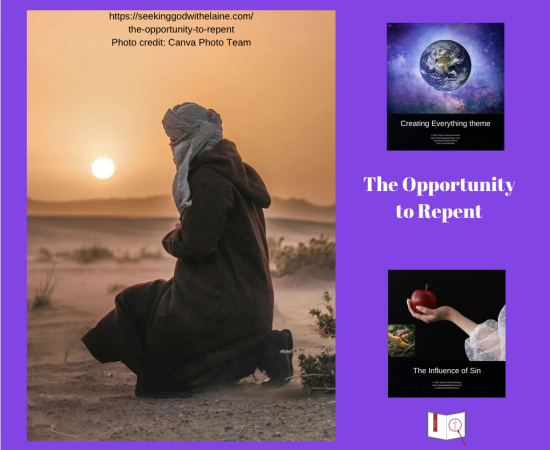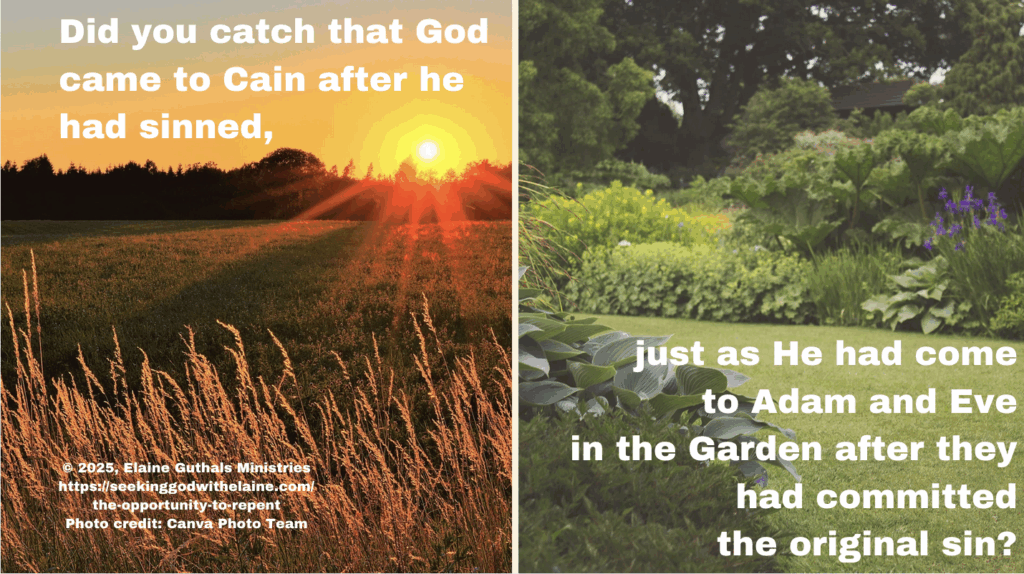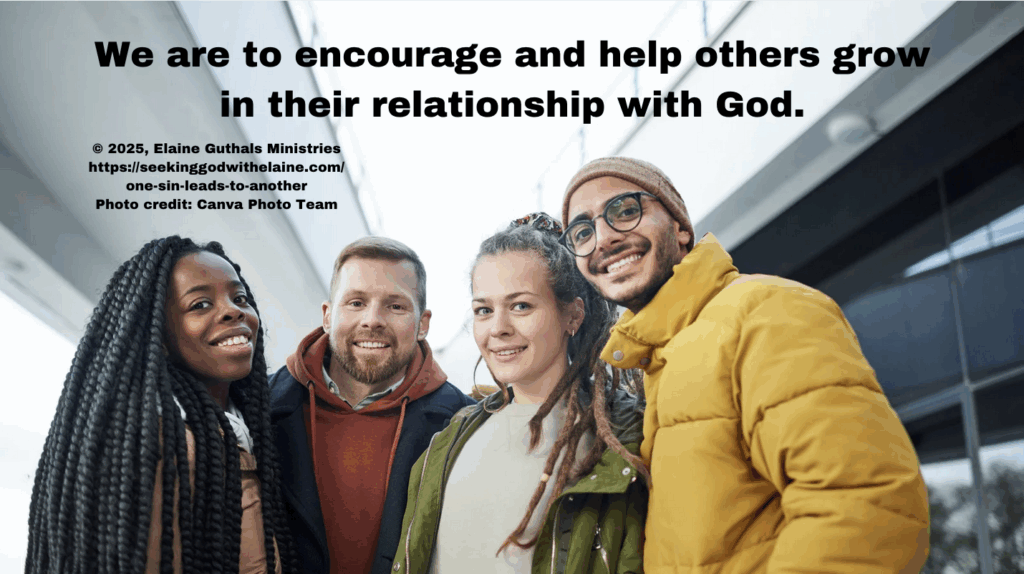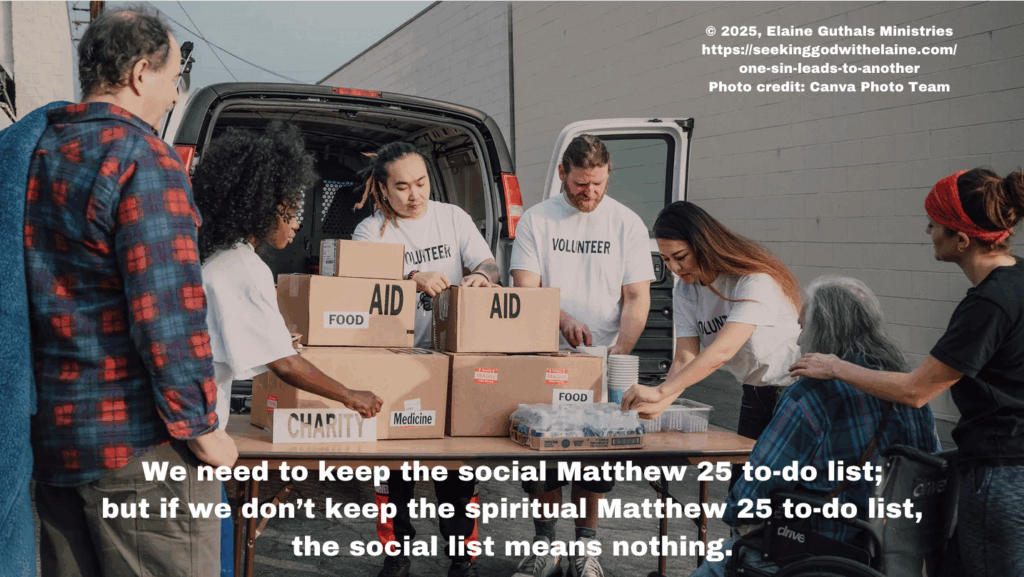In the last verse, Cain had killed his brother Abel. This devotional reading looks at God questioning Cain in order to give him the opportunity to repent and Cain’s sentence when he doesn’t.
Nuggets
- It doesn’t sound like it takes long for God to catch up with Cain.
- Even though God knew Cain had killed Abel and didn’t have to ask, He allowed Cain the opportunity to repent.
- Cain didn’t want to be questioned about what happened to his brother.
- God wasn’t buying anything Cain was selling.
Cain received his punishment.

Cain went and did it. In his anger, he killed Abel.
What was God going to think? More importantly, what would God do?
Let's Put It into Context
To read devotions in the Creating Everything theme, click the button below.
Devotions in the The Influence of Sin series
Questions Asked and Answered
“Afterward the Lord asked Cain, ‘Where is your brother? Where is Abel?’ ‘I don’t know,’ Cain responded. ‘Am I my brother’s guardian?’ But the Lord said, ‘What have you done? Listen! Your brother’s blood cries out to me from the ground!’” (Gen. 4: 9-10 NLT)
Afterward
It doesn’t sound like it took long for God to catch up with Cain.
Afterward is a transition word. That makes us go back to the last verse. One day Cain suggested to his brother, ‘Let’s go out into the fields.’ And while they were in the field, Cain attacked his brother, Abel, and killed him” (Gen. 4: 8 NLT).
At a minimum, it could mean it was after Cain came back from the field. At most, it does mean that it is after he killed Abel.
But again, we aren’t told the time frame.
Did you catch that God came to Cain after he had sinned, just as He had come to Adam and Eve in the Garden after they had committed the original sin?

Yes, sinful Cain was in God’s presence. “So Cain left the LORD’s presence and settled in the land of Nod, east of Eden” (Gen. 4: 16 NLT).
Where Is Your Brother?
Even though God knew Cain had killed Abel and didn’t have to ask, He allowed Cain the opportunity to repent.
I wonder if God had asked Cain before where Abel was. Depending on the age spread between them, I’d bet big brother was in charge of little brother at some point in their lives.
God didn’t say, “Get away from me, you murderer!” He said, “Let’s talk this through and see if you can take responsibility for what you did and be sorry about it.”
Satan is the one that says we don’t need to take responsibility for our actions. He tells us to do the exact opposite of what God wants.
Instead – just as He had done with Adam and Eve in the Garden – God was giving Cain the opportunity to confess and repent.
Sin cannot be forgiven if we don’t acknowledge what we did was disobedient to God. The churchy word for that is confession of sin. God will always allow us to do that.
Melvill had an interesting thought. What if Cain would have repented? Yes, Abel would still be dead, but Cain’s life would have been totally different.
Resource
No, Cain didn’t repent. Instead, he acted more like a two-year-old.
Am I My Brother’s Guardian?
Cain didn’t want to be questioned about what happened to his brother.
God asked Cain where Abel was, and Cain immediately lied. Some don’t think lies are that important, but they are. “For you are the children of your father the devil, and you love to do the evil things he does. He was a murderer from the beginning. He has always hated the truth, because there is no truth in him. When he lies, it is consistent with his character; for he is a liar and the father of lies” (Jn. 8: 44 NLT).
Oops. Cain did both those things. Plus, he lied to God’s face.
God was looking for humble. Instead, Cain’s words carry a snippy, snarky tone.
Cain tried to deflect God’s question by claiming ignorance. Why should I know where Abel is? How dare you ask me!
Did Cain really think his anger was going to fix everything? Was his sarcasm going to earn points with the Sovereign God?
Nope.
It is good to remember that the person asking this question had just committed a heinous sin. He had blood on his hands.
What was God feeling at that time? He was sad that Cain had killed Abel, and He was sad that he wasn’t accepting responsibility for his actions.
Champney had an interesting take. He questioned whether Can’s choice of words —brother’s keeper — was a dig at Abel’s profession of shepherd.
Resource
A shepherd takes care of his sheep. Was Cain supposed to take care of Abel?
Well, yes. Jesus told Peter three times that he was supposed to take care of His sheep (Jn. 21: 15, 16, 17).
Spurgeon made an interesting statement. He wrote, “The more needy, the more destitute people are, the greater is their claim upon us …” He backs this up by referencing the Matthew 25 to-do list, which we will talk about in the connections.
Resource
Talk about selfish! That just shows us how hard Cain’s heart was. He was only thinking about himself and his hatred of Abel because of his perceived slight.
This brings up a good point. We know Jesus was asked who is our neighbor. (Lk. 10: 25-37).
Jesus also addressed who is our brother. “Jesus asked, ‘Who is my mother? Who are my brothers?’ Then he pointed to his disciples and said, ‘Look, these are my mother and brothers. Anyone who does the will of my Father in heaven is my brother and sister and mother!’” (Mt. 12: 48-50 NLT).
Don’t read this wrong. Abel had to take responsibility for his actions, just as Cain did for his. Abel had to decide on his own whether he would follow God or not.
But that tells us that we have a spiritual responsibility to others. This is very evident in our marching orders.
- “And then he told them, ‘Go into all the world and preach the Good News to everyone’” (Mk. 16: 15 NLT emphasis added).
- “Therefore, go and make disciples of all the nations, baptizing them in the name of the Father and the Son and the Holy Spirit. Teach these new disciples to obey all the commands I have given you. And be sure of this: I am with you always, even to the end of the age” (Mt. 28: 19-20 NLT emphasis added).
Preach, baptize, teach – not push. We are to encourage and help others grow in their relationship with God.

Is the answer to this question that important? YES!!!!
Warren stressed that the answer describes what kind of law God would have. Would it be a law of self or a law of love?
Resource
God would have a law of love.
Think about what else Spurgeon said. If we say we aren’t our brother’s keeper, we are blaming God for our sin since He is everyone’s keeper.
But isn’t that what the Plan of Salvation is all about? Jesus didn’t say, “Am I my brother’s keeper?” No, He said, “I will be the substitute for everyone because I care that much for them.”
Cain was deceiving himself. His sacrifice was unacceptable, not only because it did not atone for his sins, but it also did not cut out his love of self.
How do the two greatest commandments describe what morality reality is? True morality is the love of God and the love of others. When we do not have that, we may find the very element of murder within us.
God doesn’t want us to respond with murderous rage. He wants us to respond with mercy.
Your Brother’s Blood
God wasn’t buying anything Cain was selling.
We know that God knows everything. He is omnipresent and omniscient.
God didn’t have to ask where Abel was. He knew. He didn’t have to ask what Cain did. He knew.
But God said that Abel’s blood called to Him. Let’s see what Maclaren said. He wrote,
“That [the innocent blood having a voice which pierces the heavens] teaches in the most forcible way the truth that God knows the crimes done by ‘man’s inhumanity to man,’ even when the meek sufferers are silent.”
Resource
Let’s say that in plain English. Good knows everything we do — the good and the bad. What we think we have hidden isn’t.
Cain may have buried Abel. He may have washed off the blood from whatever ground or plant it splashed on.
But God can still see. He knows.
Apply that to our situations. We think God doesn’t see when we sin. We think He is just as blind when someone sins against us.
Rest assured, God sees us. He knows what we do and what happens to us.
Think about this. Abel’s sacrifice was accepted because it was a blood sacrifice. Only blood covers sins – an animal’s blood temporarily, Jesus’ blood permanently.
Tie this to Revelation.
- “When the Lamb broke the fifth seal, I saw under the altar the souls of all who had been martyred for the word of God and for being faithful in their testimony” (Rev. 6: 9 NLT).
- “Then a white robe was given to each of them. And they were told to rest a little longer until the full number of their brothers and sisters — their fellow servants of Jesus who were to be martyred—had joined them” (Rev. 6: 11 NLT).
The martyrs’ blood was shed for their faith in God and Jesus Christ. Oh, I bet their blood called to God. They were killed only because of their belief in Jesus as our Savior.
Cursed and Banished
“Now you are cursed and banished from the ground, which has swallowed your brother’s blood. No longer will the ground yield good crops for you, no matter how hard you work! From now on you will be a homeless wanderer on the earth” (Gen. 4: 11-12 NLT)
Cain received his punishment.
Let’s review a second. What was the second sin, and what was God’s response?
- “… The Lord accepted Abel and his gift, but he did not accept Cain and his gift …” (Gen. 4: 4-5 NLT).
- “You will be accepted if you do what is right. …” (Gen. 4: 7 NLT).
God did not accept Cain’s worship, but He did not banish him forever. He gave him a second chance.
Cain killed Abel, and God punished him from His presence. There was no third chance.
Does that surprise us? It seems like God didn’t kick Cain for his lack of faith, but He totally punished him for a social issue.
That is what mercy is. God doesn’t punish us as we deserve. He also holds off our punishment until it is our time to be punished.
But if we think that we aren’t going to be punished, we read right over the part about being cursed. We don’t want to be cursed, which is more than being cussed at.
- “Then the King will turn to those on the left and say, ‘Away with you, you cursed ones, into the eternal fire prepared for the devil and his demons” (Mt. 25: 41 NLT).
- “But if you refuse to listen to the Lord your God and do not obey all the commands and decrees I am giving you today, all these curses will come and overwhelm you” (Deut. 28: 15 NLT).
- “The Lord himself will send on you curses, confusion, and frustration in everything you do, until at last you are completely destroyed for doing evil and abandoning me” (Deut. 28: 20 NLT).
Cursed means that we are unrepentant and not a child of God.
So, Cain broke both of the greatest commandments when he chose not to repent. “And you must love the Lord your God with all your heart, all your soul, all your mind, and all your strength.’ The second is equally important: ‘Love your neighbor as yourself …” (Mk. 12: 30-31 NLT).
Smith agreed. He noted that Cain’s answer contained held “Defiance of God” and “Disregard of humanity.”
Resource
Wow! Did you see Cain’s punishment? We would say it hit him in the pocketbook.
- “… When they grew up, Abel became a shepherd, while Cain cultivated the ground” (Gen. 4: 2 NLT).
- “No longer will the ground yield good crops for you, no matter how hard you work! From now on you will be a homeless wanderer on the earth’” (Gen. 4: 12 NLT).
Cain not only had his occupation taken from him, but he also had his purpose taken. He lost what he offered God.
Candlish had an idea as to why this happened. He wrote, “This employment of a cultivator of the soil seems originally to have possessed a certain preeminence of rank, and it had this manifest advantage, that it was a stationary occupation — a settled line of life.”
Resource
Ooo, baby! A farmer is tied to the land. I remember that the only reason Dad got to go to Grandma’s funeral was because it was winter and one of my uncles was on vacation and could milk the cows. He couldn’t go to my cousin’s wedding because it was planting season.
Cain, who we would see as a homebody, would after that be homeless and a wanderer.
Talk about a culture shock!
Making the Connections #1
We see in Genesis 4 how sin had progressed. Eve was tempted by fruit. Cain was tempted to corrupt what was in his heart.
Remember, we said Cain had envy, anger, and hatred in his heart. That led to murder.
Some of us may be able to justify Eve’s sin as she was wanting knowledge – to be better than she was. Cain just was angry and hurt.
Making the Connections #2
Look what Spurgeon said. He wrote,
“He would not have proceeded to the cruel deed of bloodshed if he had not first cast off the fear of God and been ready to defy his Maker. Having committed murder, the hardening influence of sin upon Cain’s mind must have been intense, and so at last he was able to speak out to God’s face what he felt within his heart, and to say, ‘Am I my brother’s keeper?'”
Resource
If Cain would have seen God for Who He truly is – a God of love – he would not have feared Him.
We need to know the real God. That starts with head knowledge, but we’ve got to get it down to heart knowledge.
If we approach God thinking He is some cruel judge that is going to sentence us for any perceived infraction, that raises the fear factor. That makes us not want to be in God’s presence.
But when we get to know God, we learn of His love, grace, and mercy. Yes, He is the Judge, but that position is carried out through the attributes that make up His character.
Cain could not do it. Don’t be like Cain.
Making the Connections #3
So many worldview people think that being a good person should be good enough. In that way, all could be eligible for heaven because all have the capacity to be a good person.
True, we may not all have the gift to serve others in certain ways.
But that is not what God says. We were created to worship Him. It is our decision to obey Him or not.
Worldview people see the Matthew 25 to-do list and think that is all we need to do to earn salvation. No, Jesus is the only way to salvation.
- “Salvation is not a reward for the good things we have done, so none of us can boast about it” (Eph. 2: 9 NLT).
- “There is salvation in no one else! God has given no other name under heaven by which we must be saved” (Ac. 4: 12 NLT).
- “You must not have any other god but me. You must not make for yourself an idol of any kind or an image of anything in the heavens or on the earth or in the sea” (Ex. 20: 3-4 NLT).
- “Jesus told him, ‘I am the way, the truth, and the life. No one can come to the Father except through me’” (Jn. 14: 6 NLT).
Worldview people think disciples should not judge them. Spurgeon doesn’t call it judging, but he argues that we cannot witness to others — and keep the first greatest commandment — if we do not try to ascertain where others are in their relationship with God. He wrote, “… without looking to other men’s souls, we cannot keep the first of the two great commands in which our Lord has [summarized] the moral law.
Resource
No, knowing God’s laws, seeing someone else is breaking those laws, and witnessing to them is not our judging them. It is loving them enough to not want God to have to judge them — which He eventually will.
We need to keep the social Matthew 25 to-do list; but if we don’t keep the spiritual Matthew 25 to-do list, the social list means nothing.

Making the Connections #4
Even from the get go, families have been dysfunctional. Sherwood says that this is the polar opposite of how it was created. He wrote, “The family institution was ordained as the first and fundamental condition of society, in order to imbed the idea of responsibility in the very foundation and structure of society.”
Resource
Families were supposed to be a cohesive unit. Yes, we were supposed to take responsibility for each other. We were given each other to love.
Jesus came into the world to restore the meaning is family. “But to all who believed him and accepted him, he gave the right to become children of God” (Jn. 1: 12 NLT).
Take this a step further. We need to realize the great responsibility parents have to raise their children to be godly men and women. My son Adam’s eternal life is within my hands.
Yes, it is Adam’s responsibility alone to choose to follow God. It is my duty to mold him into someone who will take responsibility for his actions and to see the necessity of choosing God.
How Do We Apply This?
- Don’t lie to God and try to deny our sin.
- Keep God’s laws so that we don’t deny He has the right to make them.
- Show mercy to others so that we don’t deny claim to God’s mercy.
Resources
Father God. Forgive us when we sin against You and others. Guide us to take responsibility for our actions. Help us to find our way back to You. Amen.
What do you think?
Leave me a comment below (about this or anything else) or head over to my Facebook group for some interactive discussion.
If you don’t understand something and would like further clarification, please contact me.
If you have not signed up for the email providing the link to the devotions and the newsletter, do so below.
If God has used this devotion to speak with you, consider sharing it on social media.